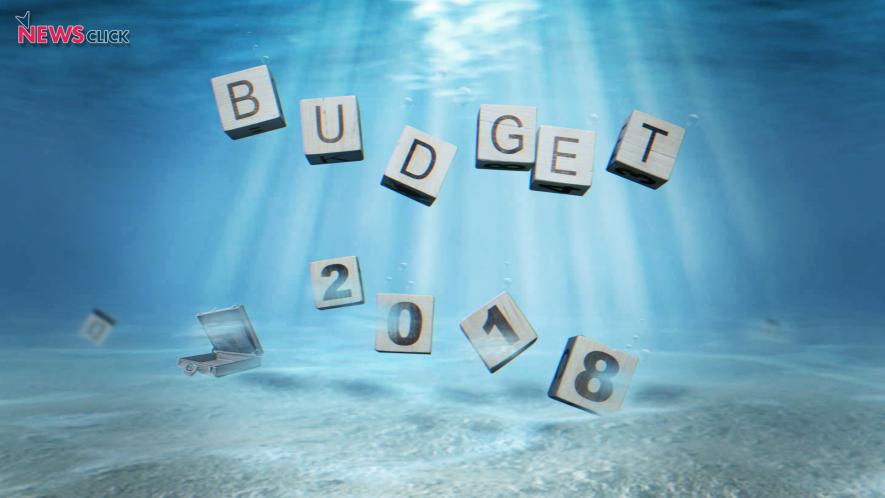Budget is Constrained by Moody’s Ratings

Newsclick Image by Nitesh Kumar
The union budget for the year 2018-19, which is going to be the last full budget before the next parliamentary elections, was placed in the parliament on 1st February, 2018. Two big schemes have been proposed in this – one on health insurance and another on price insurance for the agricultural crops. The first scheme is supposed to cover 40% of the population and the second scheme is supposed to benefit more than 50% of the population who are dependent on agriculture for livelihood. Noted economist Prof. Prabhat Patnaik called the budget -“Fantabulous schemes with not a paisa earmarked” (www.thecitizen.in, 3rd February). Indeed the government has allotted no extra money to pay for the premium of this grand health insurance scheme, which is supposed to cover 10 crore households, for upto Rs.5 lakh per year. Noted agricultural economist Prof. Ashok Gulati said “Government’s claim that it has given support prices that are 50 per cent over input costs to farmers is a sleight of hand” (www.indianexpress.com, 6th February). And if the government actually sets the MSP at 150% of the total input cost - including the cost of family labour, imputed rent on owned land and interest on own capital (i.e. C2 and not A2), then there should have been sufficient allocation for that in the budget. The ex-finance minister Shri P.Chidambaram opined that the government just payed lip service to important sectors like health and education (www.indianexpress.com). In fact, as proportion of GDP, the expenditure on health is budgeted to come down from 0.32% in 2017-18 (revised estimate, RE) to 0.29% in 2018-19 (budget estimate, BE). Similarly, the budget expenditure on education will reduce from 0.49% to 0.45%.
The total revenue receipt of the central government is 8.97% of GDP in 2017-18 (RE) and it is expected to be 9.22% in 2018-19 (BE). Whereas, the central government expenditure has been budgeted to be 13% in 2018-19 (BE) as compared to that of 13.2% in 2017-18 (RE). As a result, the expected fiscal deficit is actually declining from 3.5% in 2017-18 (RE) to 3.3% in 2018-19 (BE).
There is large scale unemployment and underemployment across skill levels, along with the a lot of unutilised capacity in almost every sector of the economy. These two programmes would have enhanced the total government expenditure by at least 2% of GDP (i.e. by more than Rs. 3 lakh crore), if sufficient extra allocation would have been there in the budget. Such a boo fiscal boost was essential for employment generation at a large scale in the face of shrinking job opportunities.
People may have apprehensions regarding the efficiency of the model of private insurance based healthcare for the poorer sections of population. They may also have doubts about the efficiency of fixing an MSP to all crops, in all states, at 50% higher rate than the actual cost of production – possibly directing larger subsidy to the bigger land-owners. Still, it would have served the purpose to some extent.
However, the finance minister did not put any extra money for these two schemes because of the fear of higher fiscal deficit (as proportion of GDP). Enough number of empirical studies have shown that fiscal deficit doesn’t necessarily cause crowding-out of private investment or inflation, at least in Indian context. However, the Moody's rating then would have certainly gone down. India would not have been preferred by the international finance capital as an investment destination. This seems to be the trade-off between making international investors happy and making economic policy according to the domestic priorities. That is why, despite having grand plans, in my view, this budget remained constrained by Moody's ratings – money could not be allocated in the budget to materialise the plans.
Interestingly, ‘Moody's Investors Service’ upgraded India’s rating as an investment destination, from the point of view of international finance capital, slightly (from Baa3 to Baa2) and changed the outlook from ‘stable’ to ‘positive’ in last November (17th November, 2017). However, Moody's warned that India’s rating could be downgraded if its fiscal metrics and the outlook for general government fiscal consolidation deteriorates (See A.R.Mishra, www.thelivemint.com, 18th November, 2017). And after the budget, Moody's analyst told that India's 2018-19 budget is in line with the government's fiscal consolidation path, adding that it reinforced the credit ratings agency's recent rating upgrade for the country (www.economictimes.indiatimes.com). Therefore, not only the size of this year’s budget, but all budgets in the recent past are being constrained by the fiscal conservatism as per the wish of international finance capital.
The enactment of the fiscal responsibility and the budget management (FRBM) Act and the report of its review committee with more stringent conditionality are in place to please the international investors. The space for Keynesian expansionary fiscal policy to generate larger employment opportunities under a demand constrained situation has been curbed by the Moody's ratings. The expected rate of return on investment has relatively come down, the business confidence is relatively low, the investment rate is falling, the non-food credit offtake is not growing, the non-performing assets are piling up in the commercial banks and the job opportunities are drying up in India today. But, still we had to reduce the capital expenditure as a proportion to GDP, and could not even think of going for an expansionary budget because of the perceived fear of being downgraded in the eyes of the owners of the international finance capital. The fiscal space for government policy making in this country is ultimately being constrained by the international rating agencies.
Get the latest reports & analysis with people's perspective on Protests, movements & deep analytical videos, discussions of the current affairs in your Telegram app. Subscribe to NewsClick's Telegram channel & get Real-Time updates on stories, as they get published on our website.
























